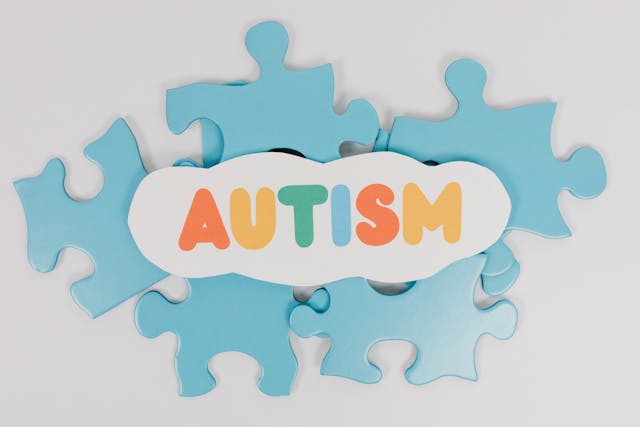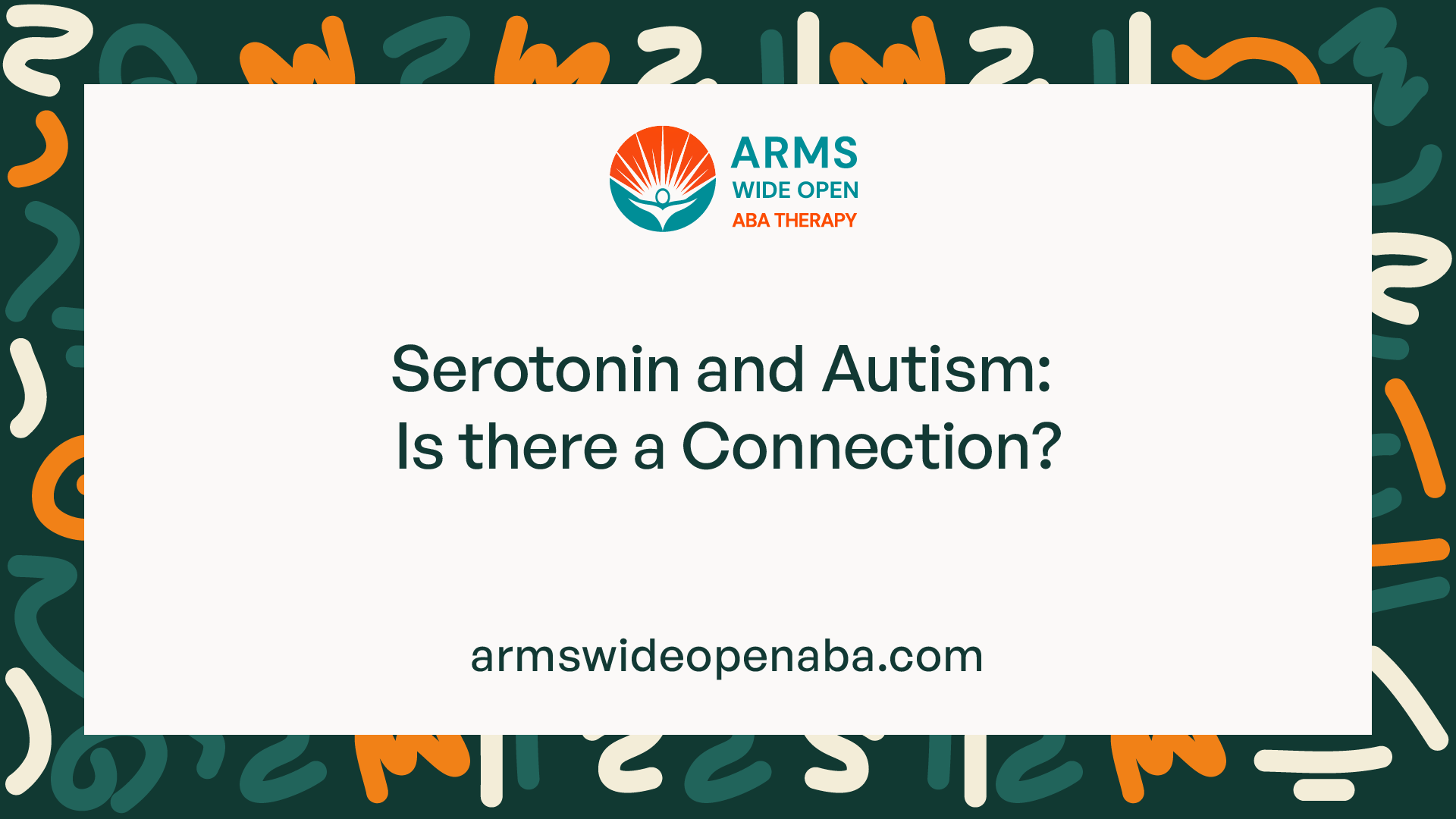Serotonin and Autism: Is there a Connection?
Exploring the serotonin-autism connection: Unveiling the theories and potential link between serotonin and autism

Serotonin and Autism: An Introduction
In recent years, researchers have been investigating the potential connection between serotonin and autism. Serotonin, a neurotransmitter, plays a crucial role in various physiological and neurological processes. Autism, on the other hand, is a complex neurodevelopmental disorder characterized by difficulties in social interaction, communication, and repetitive behaviors. By understanding the role of serotonin and the characteristics of autism, we can explore the possible link between the two.

Understanding Serotonin
Serotonin, also known as 5-hydroxytryptamine (5-HT), is a chemical messenger in the brain and body. It is involved in regulating mood, sleep, appetite, and many other functions. Serotonin is synthesized in the brain and is primarily stored in specialized cells called neurons. When released, it binds to specific receptors, influencing the activity of various brain circuits.
Serotonin levels can be affected by several factors, including genetics, diet, and environmental factors. Imbalances in serotonin signaling have been associated with various psychiatric and neurological disorders, including depression, anxiety, and autism.
Defining Autism
Autism, or autism spectrum disorder (ASD), is a complex developmental condition that typically appears in early childhood. It affects individuals' social skills, communication abilities, and behavior patterns. While the exact causes of autism are still being studied, it is widely believed to result from a combination of genetic and environmental factors.
Autism is characterized by a wide range of symptoms and levels of impairment. Some common features include difficulties in social interactions, challenges with verbal and nonverbal communication, and repetitive behaviors or restricted interests. Sensory processing issues, such as heightened sensitivity to certain sounds or textures, are also commonly observed in individuals with autism.
Understanding the relationship between serotonin and autism is a topic of ongoing research. By examining the theories and scientific evidence related to serotonin imbalance, genetic factors, brain development, and the manifestation of autism symptoms, we can gain valuable insights into this intriguing connection.
The Serotonin-Autism Connection: Theories and Research
The relationship between serotonin and autism has been the subject of extensive research and investigation. While the exact nature of this connection is still being explored, several theories and studies have shed light on the potential role of serotonin in autism spectrum disorder (ASD).
Serotonin Imbalance Hypothesis
The serotonin imbalance hypothesis suggests that abnormalities in serotonin neurotransmission may contribute to the development of autism. Research has shown that individuals with ASD may have altered levels of serotonin in their brains, leading to disruptions in various neurodevelopmental processes.
Though serotonin is primarily known for its role in regulating mood, appetite, and sleep, it also plays a vital role in brain development and function. Alterations in serotonin levels or its receptors may impact neural circuits involved in social communication, behavior, and sensory processing, which are often affected in individuals with autism.
Genetic Factors and Serotonin
Genetic factors also play a significant role in the serotonin-autism connection. Several genes involved in serotonin signaling have been implicated in ASD. Mutations or variations in these genes can disrupt serotonin pathways, potentially contributing to the development of autism.
One such gene is the serotonin transporter gene (SLC6A4), which regulates the reuptake of serotonin in the brain. Certain variations in this gene have been associated with an increased risk of autism. Additionally, other genes involved in serotonin synthesis, metabolism, and receptor function have also been linked to ASD susceptibility.
Serotonin and Brain Development
During prenatal and early postnatal development, serotonin plays a critical role in shaping the developing brain. It influences processes such as neuronal migration, synapse formation, and circuit formation. Disruptions in serotonin signaling during these crucial periods may lead to alterations in brain connectivity and contribute to the development of autism.
Research using animal models has demonstrated that manipulating serotonin levels during early brain development can result in behavioral and social impairments reminiscent of autism-like symptoms. These findings support the hypothesis that serotonin is intricately involved in the complex processes underlying brain development and may contribute to the etiology of autism.
Understanding the theories and research surrounding the serotonin-autism connection provides valuable insights into the potential mechanisms underlying ASD. However, it is important to note that autism is a complex disorder with multiple factors contributing to its development. Further research is necessary to unravel the intricate interplay between serotonin, genetics, and brain development in autism.
Serotonin and Autism Symptoms
Serotonin, a neurotransmitter known for its role in regulating mood and behavior, has been implicated in the development and manifestation of autism. Understanding how serotonin influences autism symptoms can provide valuable insights into the condition. In this section, we will explore three key areas where serotonin is thought to impact autism symptoms: social impairments, repetitive behaviors and restricted interests, and sensory processing issues.
Social Impairments
One of the hallmark symptoms of autism is social impairment. Individuals with autism often struggle with social interactions, such as understanding and responding to social cues, maintaining eye contact, and engaging in reciprocal conversation. Serotonin has been implicated in these social difficulties. Research suggests that serotonin abnormalities may contribute to the impairments in social behavior observed in individuals with autism.
Repetitive Behaviors and Restricted Interests
Repetitive behaviors and restricted interests are another characteristic feature of autism. These behaviors can manifest as repetitive movements (e.g., hand-flapping, rocking), adherence to strict routines, and intense focus on specific topics or objects. Serotonin dysregulation has been proposed as a potential underlying factor in the development of these repetitive and restricted behaviors. Studies have shown that serotonin plays a role in modulating the brain circuits involved in regulating repetitive behaviors and attention.
Sensory Processing Issues
Many individuals with autism experience sensory processing issues, where they may be hypersensitive or hyposensitive to certain sensory stimuli. This can lead to over- or under-responsiveness to sensory input, resulting in discomfort or difficulty in processing sensory information. Serotonin is involved in sensory processing and has been suggested to play a role in the atypical sensory experiences reported by individuals with autism. However, the exact mechanisms by which serotonin influences sensory processing in autism are still being investigated.
Understanding the role of serotonin in autism symptoms, such as social impairments, repetitive behaviors and restricted interests, and sensory processing issues, is a complex and ongoing area of research. While serotonin dysregulation appears to be associated with these symptoms, it is important to note that autism is a multifaceted condition influenced by various genetic and environmental factors. Further research is needed to elucidate the intricate relationship between serotonin and autism symptoms and to develop more targeted interventions that can improve the quality of life for individuals with autism.
Serotonin-Targeted Treatments for Autism
Understanding the potential connection between serotonin and autism has led researchers to explore various treatment approaches. While there is no cure for autism, targeting serotonin levels and function in the brain may help alleviate some of the symptoms associated with the condition. In this section, we will discuss three serotonin-targeted treatments for autism: serotonin reuptake inhibitors (SSRIs), serotonin-related supplements, and other serotonin-modulating approaches.
Serotonin Reuptake Inhibitors (SSRIs)
Serotonin reuptake inhibitors (SSRIs) are a class of medications commonly used to treat depression and anxiety disorders. These medications work by increasing the availability of serotonin in the brain by inhibiting its reuptake, thus prolonging its effects. SSRIs have been studied as a potential treatment for certain symptoms of autism, such as anxiety, repetitive behaviors, and irritability.

It's important to note that while some studies have shown positive effects of SSRIs on certain autism symptoms, the use of these medications should always be carefully evaluated and monitored by a healthcare professional. Individual responses to SSRIs can vary, and potential side effects and risks should be considered.
Serotonin-Related Supplements
In addition to medication, some individuals with autism may opt for serotonin-related supplements. These supplements aim to support serotonin production or enhance its effects in the brain. However, the efficacy and safety of these supplements for treating autism symptoms are still being studied, and there is limited scientific evidence to support their use.
Some commonly used serotonin-related supplements include:
- 5-HTP (5-Hydroxytryptophan): A precursor to serotonin that may increase serotonin levels.
- L-tryptophan: An essential amino acid that serves as a building block for serotonin.
- Vitamin B6: Plays a role in the production of serotonin.
It's important to consult with a healthcare professional before starting any supplementation regimen, as they can provide guidance and monitor for potential interactions or side effects.
Other Serotonin-Modulating Approaches
In addition to SSRIs and supplements, other serotonin-modulating approaches are being explored for their potential benefits in individuals with autism. These approaches include therapies that indirectly influence serotonin levels or function, such as:
- Cognitive-behavioral therapy (CBT): A type of therapy that focuses on modifying thoughts and behaviors to improve emotional regulation and reduce anxiety.
- Dietary interventions: Some dietary changes, such as reducing sugar intake or implementing a gluten-free or casein-free diet, have been suggested to impact serotonin levels, although the evidence is limited.
It's important to note that the effectiveness of these approaches can vary for each individual, and what works for one person may not work for another. As with any treatment, it's crucial to work closely with healthcare professionals to determine the most appropriate approach based on individual needs and circumstances.
While serotonin-targeted treatments show promise in addressing certain symptoms associated with autism, further research is needed to better understand their effectiveness, potential side effects, and long-term outcomes. Collaborative efforts between researchers, clinicians, and individuals with autism and their families are essential to advance our knowledge and improve the lives of those affected by autism.
Unraveling the Complexity: The Need for Further Research
While there has been significant progress in understanding the potential connection between serotonin and autism, it is important to acknowledge the limitations of current studies and the need for further research to gain a comprehensive understanding of this complex relationship.
Limitations of Current Studies
Many studies exploring the serotonin-autism connection have faced certain limitations, which should be taken into consideration when interpreting their findings. Some of these limitations include:
- Sample Size: Several studies have involved small sample sizes, which may limit the generalizability of the results. Larger studies with diverse populations are necessary to obtain more robust and representative findings.
- Methodological Variations: Different studies have employed various methodologies, making it challenging to directly compare their results. Standardization of research protocols and methodologies would enhance the reliability and validity of future studies.
- Heterogeneity of Autism Spectrum Disorder (ASD): ASD is a complex and heterogeneous condition, encompassing a range of symptoms, severities, and underlying genetic and environmental factors. This heterogeneity makes it difficult to draw definitive conclusions about the serotonin-autism connection. Future studies should consider these variations and stratify participants accordingly.
- Lack of Longitudinal Studies: Many existing studies have focused on cross-sectional data, providing a snapshot of serotonin levels or genetic variations at a particular point in time. Longitudinal studies tracking serotonin levels and autism symptoms over time would provide a more comprehensive understanding of the relationship.
Future Directions for Research
To further unravel the complex relationship between serotonin and autism, future research should address the following areas:
- Longitudinal Studies: Conducting longitudinal studies that track serotonin levels, genetic variations, and autism symptoms over an extended period would shed light on the temporal relationship between serotonin and the development of autism symptoms.
- Biomarkers and Subtypes: Exploring potential biomarkers associated with serotonin dysregulation in specific subtypes of autism could help identify distinct biological profiles and tailor treatment approaches accordingly.
- Genetic and Environmental Interactions: Investigating the interplay between genetic variations, environmental factors, and serotonin in the development and manifestation of autism symptoms would enhance our understanding of the complexity of this relationship.
- Animal Models and Translational Research: Using animal models and translational research approaches can provide valuable insights into the underlying mechanisms linking serotonin and autism. These studies can help bridge the gap between basic research and clinical applications.
Further research in these areas will contribute to a more comprehensive understanding of the serotonin-autism connection and pave the way for the development of targeted interventions and treatments for individuals with autism spectrum disorder.
Sources
https://www.crossrivertherapy.com/autism/serotonin
https://www.spectrumnews.org/news/serotonins-link-autism-explained/
https://www.ncbi.nlm.nih.gov/pmc/articles/PMC4824539/
Similar articles
We’re here to help you

Our team is here to assist you in this process. Contact us for any assistance.
it’s easy to apply
We Accept Most Insurances
Our in-network insurance partnerships make ABA therapy more accessible to families throughout our service areas.







Our Insurance Process
We'll request your insurance details to help us verify your plan's coverage for ABA therapy. Once we've received this information, we'll walk you through your benefits, including copayments, deductibles and out-of-pocket maximums, so you know what to expect in advance.
Our team will then handle the preauthorization and all the necessary paperwork.
.svg)





















.jpeg)


































.jpeg)




.jpeg)







.jpeg)











.jpeg)
















